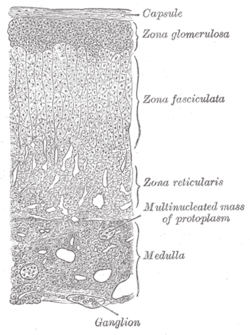Zona reticularis
| Zona reticularis | |
|---|---|
 | |
| Layers of cortex. | |
| Latin | Zona reticularis |
| Gray's | subject #277 1278 |
The zona reticularis is the innermost layer of the adrenal cortex, lying deep to the zona fasciculata and superficial to the adrenal medulla. The cells are arranged cords that project in different directions giving a net-like appearance (L. reticulum - net).[1]
Cells in the zona reticularis produce precursor androgens including dehydroepiandrosterone (DHEA) and androstenedione from cholesterol.[2] DHEA is further converted to DHEA-sulfate via a sulfotransferase, SULT2A1.[3] These precursors are not further converted in the adrenal cortex if the cells lack 17Beta Hydroxysteroid dehydrogenase. Instead, they are released into the blood stream and taken up in the testis and ovaries to produce testosterone and the estrogens respectively.
ACTH partially regulates adrenal androgen secretion,[4] also CRH.[5][6]
In humans the reticularis layer does contain 17 alpha-hydroxylase; this hydroxylates pregnenolone, which is then converted to cortisol by a mixed function oxidase. In rodents, the lack of 17alpha-hydroxylase results in the synthesis of corticosterone instead of cortisol as in the human.
.JPG)
- ↑ Histology: A Text and Atlas, 5th ed. Ross and Pawlina.
- ↑ Wheater's Functional Histology, 5th ed. Young, Lowe, Stevens and Heath.
- ↑ Rainey WE, Nakamura Y (February 2008). "Regulation of the Adrenal Androgen Biosynthesis". J. Steroid Biochem. Mol. Biol. 108 (3–5): 281–6. doi:10.1016/j.jsbmb.2007.09.015. PMC 2699571. PMID 17945481.
- ↑ http://emedicine.medscape.com/article/919077-overview#showall
- ↑ http://www.ncbi.nlm.nih.gov/pubmed/10473054
- ↑ Principles and practice of geriatric surgery, By Ronnie A. Rosenthal, Michael E. Zenilman, Mark R. Katlic, page 302
External links
- BU Histology Learning System: 14502loa
- Anatomy Atlases - Microscopic Anatomy, plate 15.292 - "Adrenal Gland"
| |||||||||||||||||||||||||||||||||||||||||||||